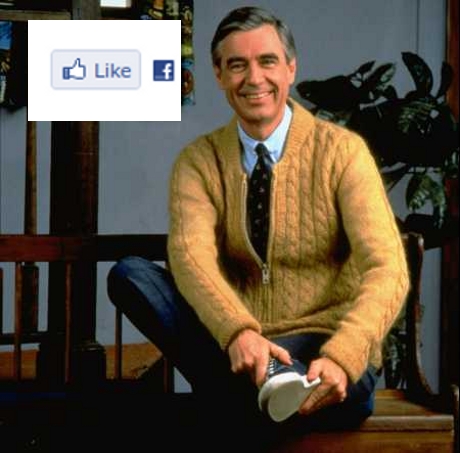FaceBook: Do we really have to "Like" everything?


The seemingly ubiquitous FaceBook "Like" button is penetrating every web site and on the surface, appears harmless. But should we really be exposing so much of our identity and privacy, even a little bit at a time?
It's you, I like, it's not the things you wear. It's not the way you do your hair. But it's you, I like. (Fred Rogers/PBS, copyright 1970)
The FaceBook generation, Generation Y, didn't grow up watching first-run episodes of Mister Rogers and listening to his ever-present philosophy of self-affirmation, the power of positive thinking and tolerance. It was mine, Generation X, that did.
While one can easily parody his soothing voice and super-casual comfy exterior, I have only good things to think and say about Fred Rogers, as does anyone who grew up in my generation.
Fred Rogers is part of the inextricable DNA which makes up part of the collective consciousness and Gemütlichkeit of Generation X. After a really tough day and when I'm feeling really crappy about myself, the musings of my inner Fred Rogers come out of that dusty 1970's closet and knock me back on my feet again.
But the self-reliance, tolerance and cooperation of Mister Rogers' Neighborhood eventually paved the way towards more "groupthink" types of programs, such as Barney & Friends, which although inclusive of Fred Rogers' legacy of love of self and an increased importance towards strong parental relationships, was much more oriented towards sharing and participation.
It is this same Barney-esque groupthink that forged the fundamental principles of the generation which built FaceBook. And FaceBook wants you to share everything with everyone, because the more you share, the more of a profile it can build on you on which it is able to then monetize.
Fortunately, there are controls which you can put on your FaceBook profile which can limit how many personal details FaceBook can actually share with other people.
But now there's more than just sharing of personal status messages, links and photos that you have to be concerned about and potentially could be a much larger intrusion on your privacy and identity.
Enter the "Like" Button, which has gone beyond the borders of FaceBook itself and on to every website and Internet property that you can possibly think of, including ZDNet, the site that you are reading now. The Like button is one of the many Social Plugins that FaceBook has provided to web developers which allows you to extend the power and groupthink of FaceBook to literally everywhere.
I can see why developers and websites want to use the Social Plugins because they drive traffic. I myself implemented the Like Button on a friend's restaurant website just this last weekend, so that she could network with her customers and provide FaceBook status updates right on the restaurant's home page.
But how far should one really go with this, though? And should we really be "Liking" everything we read or watch?
The controversial European rapper and hip-hop artist Orelsan ("The French Eminem") and music producer Simon Delacroi recently released a music video which demonstrates just how pervasive FaceBook has become in our normal lives.
In the Matrix-inspired, augmented reality fantasy world of "N'importe Comment", Orelsan and his buddy Delacroi, the "The Toxic Avenger" gather friends and "Likes" by passers-by as they stroll down the boardwalk of Venice Beach in California, by simply touching people and objects.
Orelsan's "Like" count keeps increasing as the video progresses, as does the size of his posse. It's definitely a cool video, but some of the concepts behind it concern me greatly.
While it may be our natural human inclination to tell people what we like and to want to be liked, I'm not so sure it's a good idea for FaceBook to start building large collections of datapoints on every single thing that suits our fancy or if our valuation by others should be judged by how many people "Like" us.
Sure, I can see how me "liking" the latest model Mercedes-Benz sedan or the New York Yankees might be harmless. But once FaceBook starts collecting hundreds of "Like" datapoints per user, it may be possible to build a very sophisticated demographic or even a psychological and or ideological/sociological profile for each person which may point towards a pattern of political/religious leanings and/or lifestyle choices. And then it's not so harmless.
And who should be the recipient of that "Like" data? Should FaceBook be able to sell that to potential employers, or even my current one? Should insurance companies be able to know that perhaps you "Like" Hang Gliding, Rock Climbing and Base Jumping, or any other dangerous activities that would indicate a premium risk?
Should your town government or anyone really be aware you "Like" Sarah Palin or the Tea Party? Or "Like" Supporting Israel? Or "Like" Gay Marriage or a woman's right to abort their child? Or "Like" Intelligent Design? And should your valuation as a human being have any bearing on whether or not how many people "Like" you? The list goes on and on.
Is the FaceBook "Like" button a beneficial technology for extending Social Networking to the web, or is there just too much potential for abuse? Talk Back and Let Me Know.